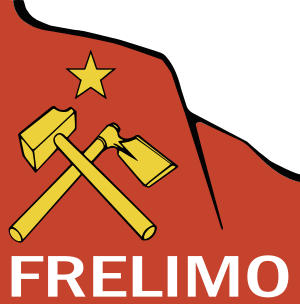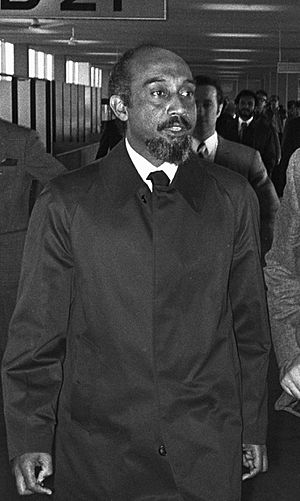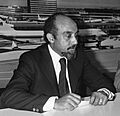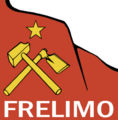Marcelino dos Santos facts for kids
Quick facts for kids
Marcelino dos Santos
|
|
|---|---|
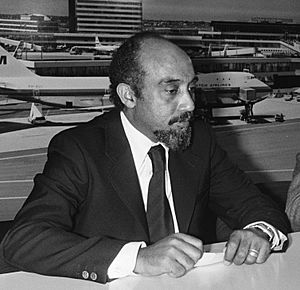
Dos Santos in 1975
|
|
| President of the People's Assembly | |
| In office 1986 – 12 January 1995 |
|
| Preceded by | Samora Machel |
| Succeeded by | Eduardo Mulémbwè |
| Vice President of Liberation Front of Mozambique | |
| In office 14 May 1970 – 30 May 1977 |
|
| President | Samora Machel |
| Preceded by | Uria Simango |
| Succeeded by | Office abolished |
| Personal details | |
| Born | 20 May 1929 Lumbo, Portuguese East Africa (now Mozambique) |
| Died | 11 February 2020 (aged 90) Maputo, Mozambique |
| Political party | FRELIMO |
Marcelino dos Santos (born May 20, 1929 – died February 11, 2020) was an important person from Mozambique. He was a poet, a freedom fighter, and a politician. He helped his country gain independence from Portugal.
As a young man, Marcelino traveled to Portugal and France for his education. He was one of the people who started the Mozambican Liberation Front (FRELIMO) in 1962. This group worked to free Mozambique from colonial rule.
Marcelino dos Santos held many important roles. He was the deputy president of FRELIMO from 1969 to 1977. Later, he led the country's parliament, called the Assembly of the Republic, from 1987 to 1994. He always believed strongly in socialist ideas, even as his party changed over time.
Marcelino also wrote poems under different names like Kalungano and Lilinho Micaia. His poems appeared in newspapers and books. One of his own poetry books, Canto do Amor Natural, was published in 1987.
Contents
Marcelino's Early Life
Marcelino dos Santos was born on May 20, 1929, in Lumbo, Mozambique. His father, Firmino dos Santos, was a political activist. Marcelino grew up in Lourenço Marques, which is now Maputo, the capital city.
He started working in a factory when he was young. There, he saw how factory workers in Mozambique were treated unfairly. These experiences, along with his father's ideas, helped shape his own beliefs.
When he was 18, Marcelino went to Lisbon, Portugal, for school. In Lisbon, he wrote poems and shared his father's ideas about uniting people who were oppressed by Portugal. He met other future leaders like Amilcar Cabral and Agostinho Neto.
Time in Paris
In the early 1950s, the Portuguese police started watching these nationalist students. Marcelino dos Santos and others had to leave Portugal. Marcelino went to France, where he worked with other African leaders who were also in exile.
In Paris, he continued to write poems using his pen names. He encouraged Portuguese exiles to oppose the government in Portugal and support freedom for African countries. He helped create the Anti-Colonial Movement (MAC) in Paris in 1957.
Marcelino also helped found the Conference of Nationalist Organisations of the Portuguese Colonies (CONCP). He became the permanent secretary, helping to organize freedom activities.
Starting FRELIMO
Eduardo Mondlane, another important African leader Marcelino knew from Portugal, wanted to unite the African colonies under Portuguese rule to fight for independence. Marcelino dos Santos strongly supported this idea.
Their connections with other scholars and leaders were very important. Julius Nyerere, the leader of Tanzania, promised to support Mozambique's fight for freedom. This led to the creation of the Front for the Liberation of Mozambique (FRELIMO).
FRELIMO held its first meeting in Tanzania in September 1962. Three main Mozambican parties joined together to form FRELIMO. This new group then led the war for independence from Portugal.
FRELIMO's Goals
FRELIMO was a liberation movement, so it needed help from different countries and groups. They wanted to get supplies and weapons for their guerrilla warfare. They also focused on getting support from the United Nations (U.N.).
By gaining international support, FRELIMO hoped to isolate Portugal from the rest of the world. They believed this would weaken Portugal's control over its African colonies. Many African countries helped FRELIMO. They felt that no African state could be truly free if colonialism still existed.
Socialist countries like the Soviet Union and China also gave a lot of help. The Soviet Union was especially useful because it had a seat on the U.N. Security Council. There, they often voted against Portugal's colonial rule. FRELIMO's main goal was military action against Portugal to gain freedom.
Marcelino's Political Career
Eduardo Mondlane, the leader of FRELIMO, was sadly killed in 1969. After his death, Marcelino dos Santos took on a very important role. He was elected to FRELIMO's new three-person leadership group.
In the late 1970s, Marcelino dos Santos became the Minister of Economic Development. He was in charge of the economy for FRELIMO in the early 1980s. From 1987 to 1994, he was the chairperson of Mozambique's parliament, the Assembly of the Republic.
Marcelino always represented the left side of the party and believed in Marxist-Leninist ideas. Even when the party considered new economic ideas, he remained firm in his socialist beliefs. He led a parliament that made many big changes. They moved from a one-party state to a system with many political parties. They also approved a new Constitution that guaranteed freedoms like speech and press. The country's name even changed from People's Republic to Republic of Mozambique.
Relations with the U.S.
After Mozambique became a free country, Marcelino dos Santos wanted to build good relationships with the United States. He hoped to develop economic ties and get help with problems like conflict within the country.
He wanted cooperation with the U.S. for emergencies, droughts, and agriculture. Marcelino dos Santos once said that he believed the U.S. and Mozambique were getting closer in their views. He felt this closeness would help them work together for peace and development.
Later Life and Legacy
On July 1, 1970, Marcelino was invited to the Vatican by the Pope. He received a special document about helping underdeveloped countries. The next year, he was given the Lenin Centenary Medal.
The war in Mozambique finally ended in 1992 when FRELIMO and another group signed a peace treaty. However, the war had made Mozambique one of the poorest countries. In 2015, Mozambicans declared Marcelino dos Santos a national hero.
Marcelino dos Santos passed away on February 11, 2020. He is remembered as a very important figure in Mozambique's history. As he once said, "A people cannot say farewell to their history."
Images for kids
 | Aaron Henry |
 | T. R. M. Howard |
 | Jesse Jackson |


